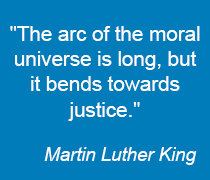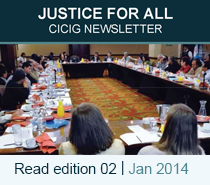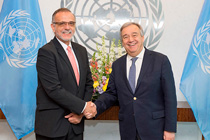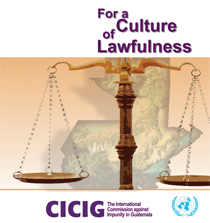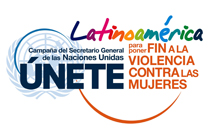 Guatemala, September 27, 2011. The different types of witness protection are a justice administration tool designed to protect individuals that provide important information to shed light on a case.
Guatemala, September 27, 2011. The different types of witness protection are a justice administration tool designed to protect individuals that provide important information to shed light on a case.
Witness protection exists in countries that have decided to incorporate such tools into their judicial systems, hence improving the capacity to solve criminal cases.
The requirements that an individual must meet in order to receive such services depend on the different States offering witness protection—they can be based on legal, economic, structural or social aspects. Therefore, it is necessary for the Governments to have the necessary laws, procedures and budgets.
The Protection Service
- In Guatemala, the service is regulated by the Law on the Protection of Parties to Proceedings and Individuals Involved in the Administration of Criminal Justice (Decree 70-96).
- The protection system is overseen by the Governing Council, which is comprised of the Attorney General of the Republic (or a representative); a delegate of the Ministry of the Interior; and the Director of the Office of Protection.
- It provides protection to the public officials and employees of the Judiciary (OJ), the civil security forces, the MP, witnesses, expert witnesses, consultants and complementary prosecutors who are exposed to risks through their participation in criminal proceedings.
- This measure also applies to journalists exposed to risks when fulfilling their duty to inform.
Moreover, these programmes must be publicized so that individuals are aware of the security guarantees available to them when they are called to give a statement or provide information in a criminal proceeding as well as at any other time when they could be subject to threats or intimidated.
In Guatemala
Witness protection is set forth in the Law on the Protection of Parties to Proceedings and Individuals Involved in the Administration of Criminal Justice (Decree 70-96), which indicates that to render judicial management more effective guarantees must be provided for the integrity and security of judges, prosecutors, public defenders and other actors involved in judicial proceedings.
This law establishes that in order for a citizen to comply with his or her duty to support the appropriate administration of justice, the State must guarantee due protection so that such a citizen is not threatened, intimidated or subject to influence peddling or other pressures.
The witness protection service is overseen by the Governing Council, which is comprised of the Attorney General of the Republic (or a representative); a delegate of the Ministry of the Interior; and the Director of the Office of Protection.
It provides protection to the public officials and employees of the Judiciary (OJ), the civil security forces, the MP, witnesses, expert witnesses, consultants and complementary prosecutors who are exposed to risks through their participation in criminal proceedings. This measure will also be provided to journalists who so request because of risks they face in fulfilling their duty to inform.
The prosecutor of the criminal proceedings could, at his or her own initiative or at the behest of the interested party, instruct the Office of Protection to conduct the respective evaluation and submit it to their Director for approval.
As part of analyzing a case, the Office of Protection should consider the following aspects when accepting a witness into the program:
a) The risk faced by the applicant must be fairly evident.
b) The severity of the punishable act and its social significance.
c) The evidentiary value of the statement used to incriminate the individuals implicated in the crime, including both the perpetrators and masterminds.
d) The possibility of obtaining the same information through other means.
e) The probability of the statement leading to the identification of perpetrators of other crimes related to the crime under investigation.
f) The protection options available, pursuant to the law.
g) The risks associated with providing such protection for society and the community where the beneficiary resides.
After the applicant is approved to receive protection, the Office of Protection shall provide notification of the decision to the judge overseeing the case, and the information should be confidential.
The beneficiaries
The Protection Service includes:
- Protection of the beneficiary by security personnel.
- Change in place of residence of the beneficiary, possibly including the payment of housing, transport and living costs.
- Protection of the place of residence and/or work of the beneficiary by security personnel.
- Any other services deemed necessary by the Governing Council of the protection system.
The entry of a witness into the protection program is determined by the risk faced by the individual set to testify or provide information about a particular crime, such as homicides, murders, kidnappings, extrajudicial killings, and trafficking in drugs and arms.
Since 2009, the International Commission against Impunity in Guatemala (CICIG) has supported the strengthening of this program by sharing the knowledge of experts in the field, helping to solve numerous criminal cases.
Between 2007 and the present day, this project has made significant strides forward thanks to the attention given to the issue by Government authorities. With CICIG support, the Office of Protection was restructured; staff received training; models were created for security and assistance protocols; and new mechanisms of witness relocation were introduced.
Furthermore, a donation made by the Government of Germany enabled CICIG to offer two training courses, each with a duration of two weeks, in July and August, respectively. U.S. Marshalls imparted the courses to 50 officials of the Protection System of the MP and the Ministry of the Interior.
Although advances have been made, the Protection System still needs to be strengthened further economically, logistically and in terms of its staff in order to improve the effectiveness of its operations.


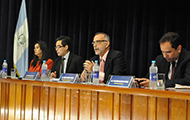
 Guatemala, September 27, 2011. The different types of witness protection are a justice administration tool designed to protect individuals that provide important information to shed light on a case.
Guatemala, September 27, 2011. The different types of witness protection are a justice administration tool designed to protect individuals that provide important information to shed light on a case.